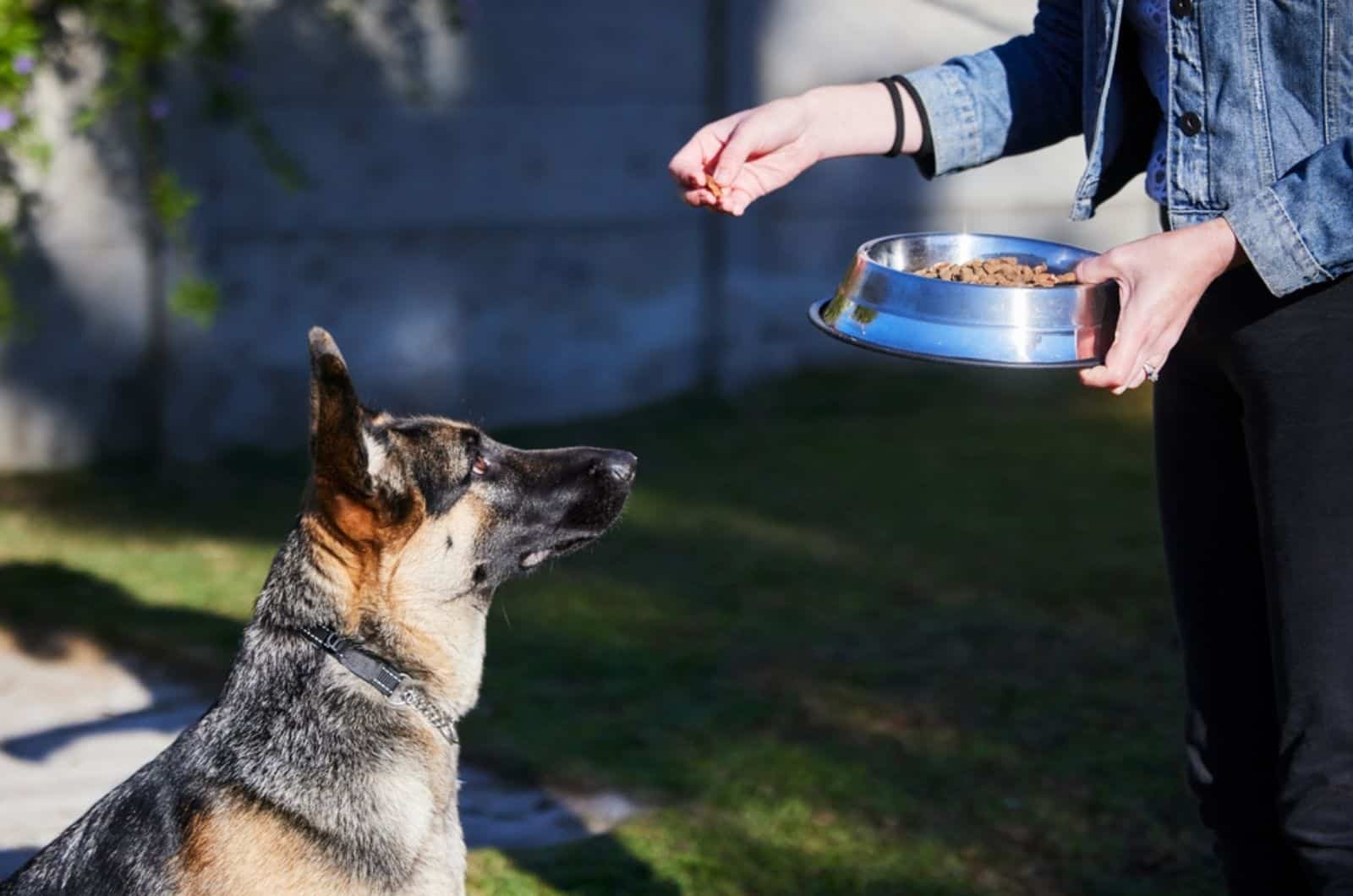Most of the dogs will do anything to get an extra bite or an additional treat. But, why does my German Shepherd dog only eat when I’m around?
There are many reasons why this behavior happens, and we will do our best to approach this matter from different perspectives in order for you to understand your dog’s behavior.
You must understand that not all dogs share the same or similar personalities, and that not all of them share the same happy childhood and happy past.
German Shepherd dogs could be fighting various mental issues by themselves, as well as being prisoners of their own learned behaviors, which is absolutely not their fault.
Let’s try to find out why your German Shepherd only eats when you are around together. I know that you are going to find your answer here, and I know that we will get the hang of this situation as soon as possible.
Why Does My German Shepherd Only Eat When I’m Around?
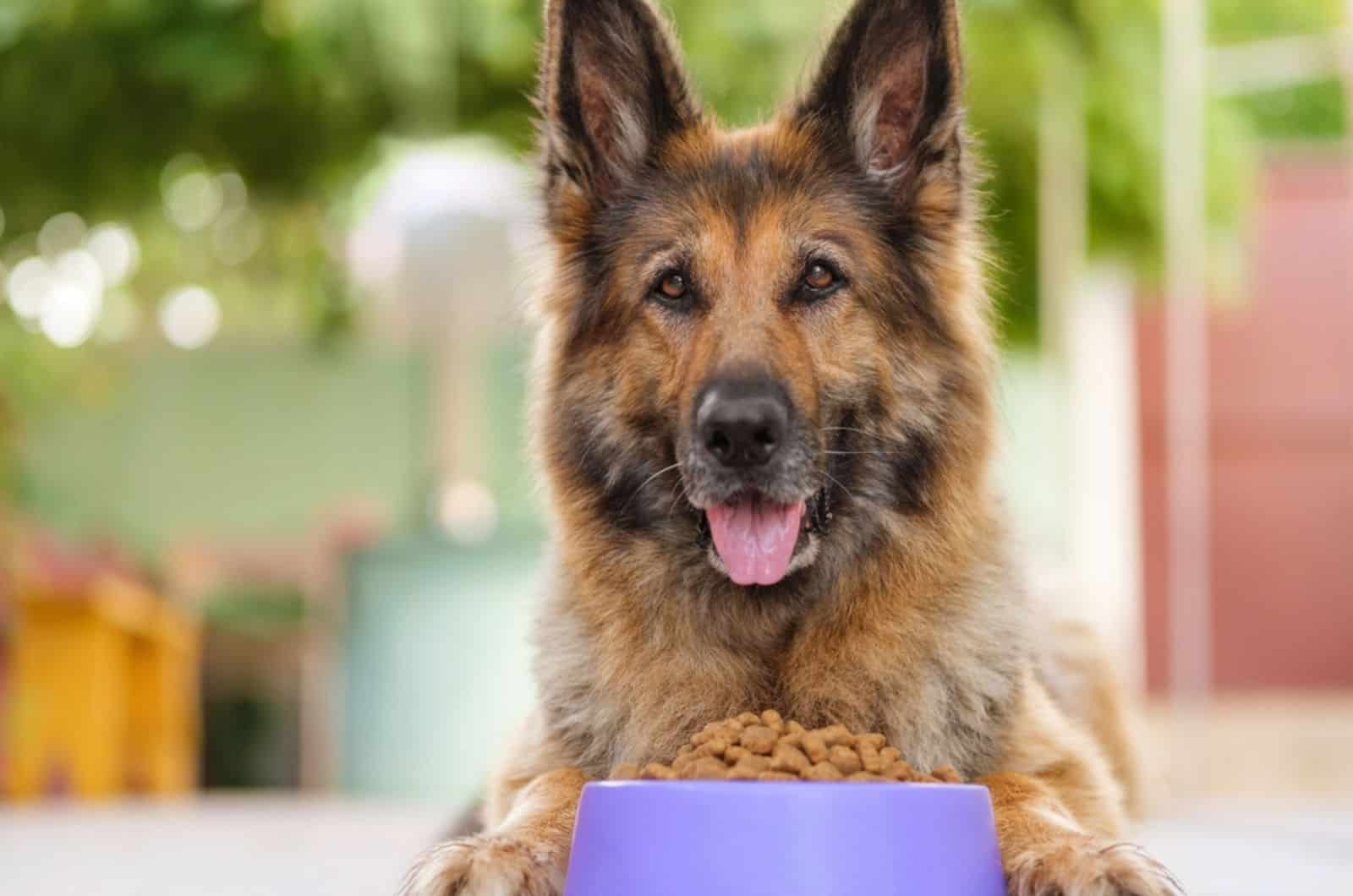
As a German Shepherd owner, you are probably aware of the fact that your German Shepherd dog is a social dog breed that enjoys human companionship.
But, do you know where these behaviors come from? One thing is for sure – the progenitor of dogs, especially those close to German Shepherds, the wolf, is a type of animal that never eats alone, and is always surrounded by its pack.
Maybe you can get an idea after reading this information; however, this is not the only reason behind this behavior.
There are many things that can influence a German Shepherd’s need to be around you whenever it has any kind of meal.
Let’s find these triggers and the root of this German Shepherd behavior together!
1. Your GSD Might Be Feeling More Secure To Eat With You Around
Our tamed German Shepherds nevertheless exhibit certain wolf-like habits. Even though the food in his bowl is merely dry kibble, your dog might be craving for the same kind of group experience that wolves kill and eat in.
For dogs, sharing a meal with others is more enjoyable. Dogs are gregarious animals by nature, and the company may encourage them to eat. There is no danger in staying in the room at mealtime if you won’t mind watching them eat.
When you sit down to eat with your pet, your strong attachment with them may come into play, particularly if your GSD has grown accustomed to receiving emotional rewards for eating.
Some GSD owners build a connection with their pets through food, particularly if the dog has a record of being a finicky eater or has previously shown decreased appetite as a result of serious digestive problems.
In certain circumstances, owners will experiment with the food they give their dogs, encourage them verbally, occasionally worry, and invest a significant amount of feelings in the process.
This might lead to a situation where the dog feels extra encouraged when eating with its owner than when eating by themselves, even if the meal isn’t particularly satisfying.
If your dog won’t eat without you, consider limiting your vocal praise at the following meal and watch to see if he starts to eat on his own. In some instances, they could be too busy guarding the house until you get home to eat.
Another explanation for this behavior could be that they are exhausted, and would rather sleep than eat. When you get back, he will finally feel secure in his surroundings, and be able to resume all the tasks he put off while you were away.
2. Your GSD Might See You As Their Pack Leader
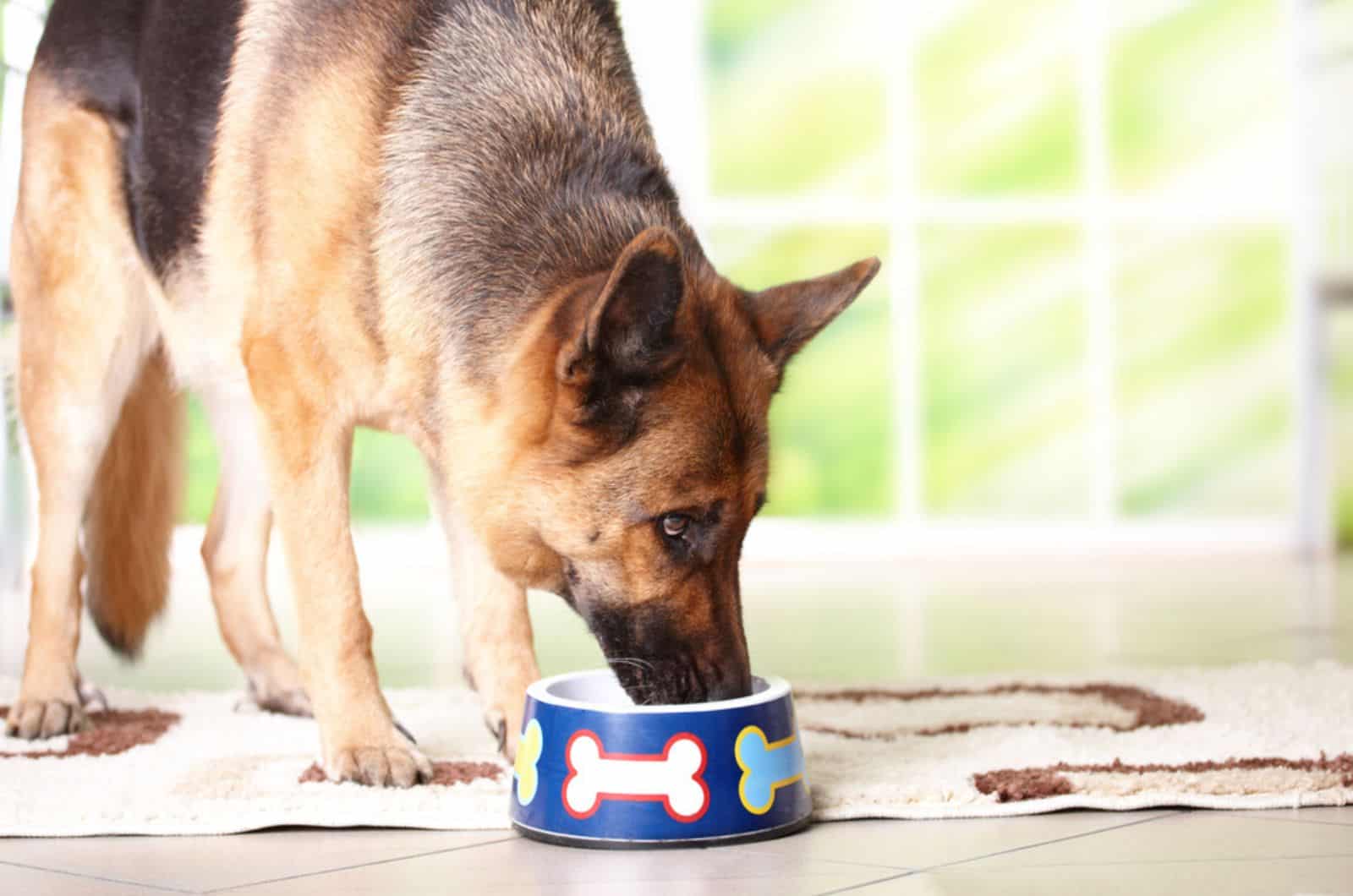
German Shepherds are pack creatures by nature. Most of them genuinely enjoy dining in social settings, much like humans do. For this reason, a lot of pack dogs would therefore prefer eating together.
There’s a good probability that your GSD is one of those sociable eaters who appreciates companionship if he or she is insisting on being with you when you eat. He does not desire to experience loneliness while eating.
I can tell you one thing: if your German Shepherd dog sees you as its pack leader, you have already done half of the job that you need to do.
German Shepherds are dominant dogs by nature because they are used to thinking with their own head and being their own boss.
However, if you have accomplished that your GSD blindly follows your orders, as well as would do anything to protect you, yet he feels subordinate to you, you are doing a good job.
To understand this behavior, and to support your dog while it’s eating, I advise you to at least grab some kind of fruit or snack and eat together with your dog. Adult dogs are usually fed once or twice a day; therefore, it won’t bother your diet if you get a snack or two a day.
If this makes your dog feel comfortable, I say, do it because this is also a great honor to you since your dog won’t start its meal unless you start it.
3. They Might Be Associating Food With Your Presence
This reason can be highly associated with the previous one; however, it does have a mind of its own in a few ways. Whenever your dog is fed, you are the one who is providing that food to your German Shepherd dog.
And, naturally, your German Shepherd will associate mealtime with its owner. Therefore, if it happens that you give your dog its food, and go do something else, your dog might not feel comfortable eating without you.
I propose you could alter the feeding schedule. Two feedings every day should be provided: one in the early morning, and one in the early evening or in the late afternoon. Try not to be too strict about the times of either feeding, though.
Leave your GSD alone and set the food down. Don’t approach it, don’t engage with it, and do not even turn to face it. Completely disregard your GSD at all costs.
No matter how much or how little your German Shepherd has consumed, pick up the dish in about 20 minutes, even if it only seems to be interested in eating. Most of the time, the meal is neglected until it is moved. Then, the dog usually abruptly becomes interested.
It wouldn’t have taken it at first if it had really wanted it, so disregard this change of mind and remove the food. The food gets picked up and carried away even if your German Shepherd doesn’t taste the meal until you reach to grab it, just so you’re clear on that.
A dog has more than enough time—20 minutes—to finish its meal. You’re attempting to alter your dog’s perception of your character and your attachment to your German Shepherd. This exercise will position you higher on the food chain as the leader and source of the food.
If your dog is trying to trick you into feeding it, a few sessions of this method will teach your German Shepherd dog to eat when it’s supposed to, and without actually doing any kind of mischief.
Read more about: 9 Weird German Shepherd behaviors
4. They Might Be Thinking That They’ll Get A Treat
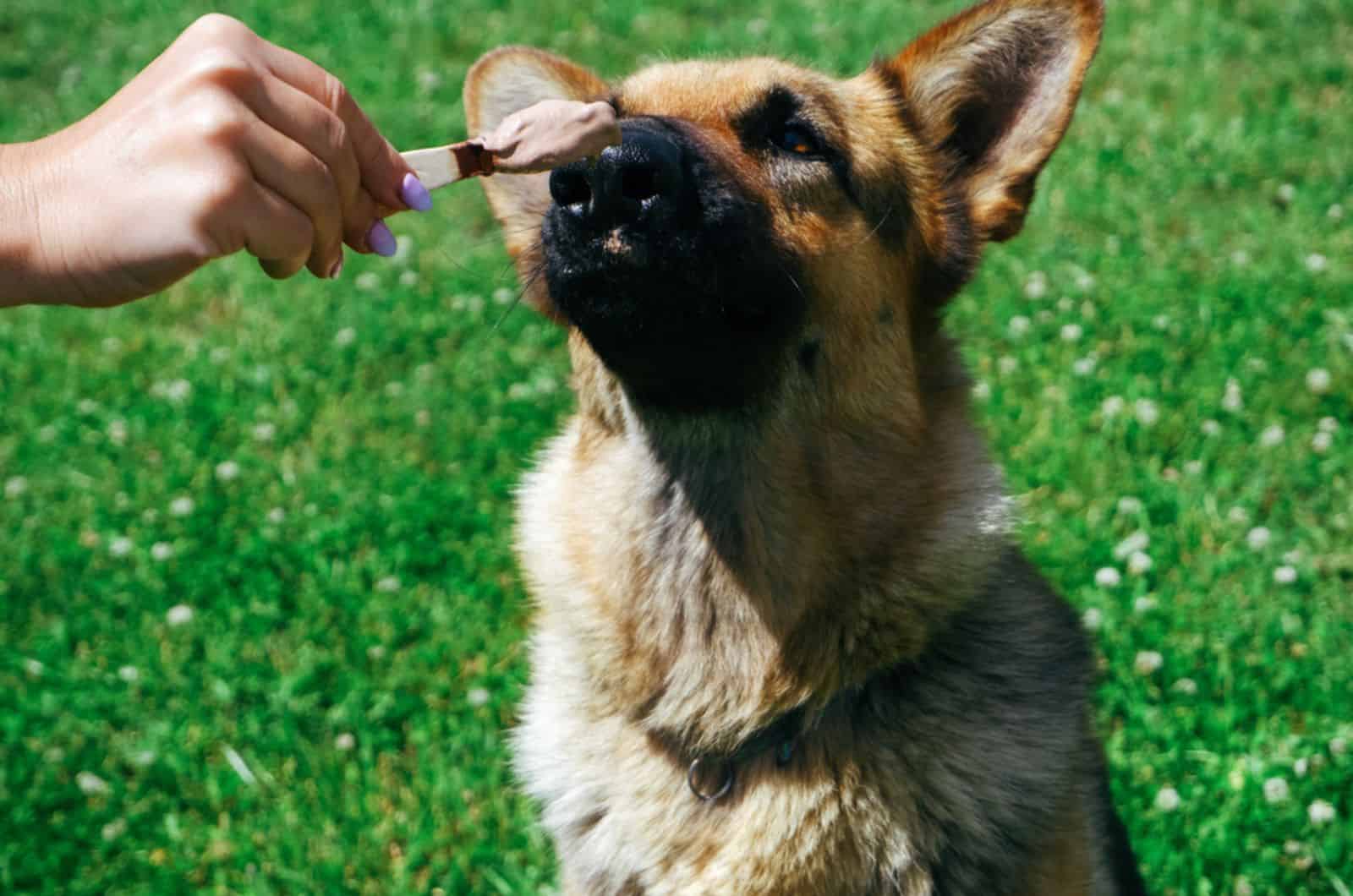
This specific behavior often happens if you are feeding your dog whenever you are having a big family lunch (you know what always happens whenever your GSD sits somewhere around the dining table).
If your dog is used to getting a bite here and there of whatever you have made for lunch, you could find yourself in this tricky situation of learned behavior.
Your dog will expect to get a bit of chicken, beef, or steamed vegetables, spare bones or even some dog treats whenever you are eating, and could potentially dismiss the dog food bowl that you have prepared for it.
The best way of repressing this behavior is in the above-mentioned way to cope with this problem. As I have mentioned, give your dog its food, and if your dog doesn’t eat it, pick up the bowl, and when it is time for the next meal, give it to your dog again.
Your German Shepherd will quickly learn that they won’t get rewarded for their spoiled behavior, and that if they want to eat, the only way that they will get their food is by following the rules that you provide for it as their pack leader.
5. Your GSD Might Be Having Separation Anxiety
Dogs’ nervousness while separated from their owner is among the most frequent causes of this behavior. In essence, this indicates that your dog is reliant on you, and is uncomfortable in your absence.
Dogs individually experience separation anxiety, which can show in many ways. Since chewing occasionally serves as a sort of stress relief, some dogs start eating more than usual.
Some dogs won’t eat until their human is back, while others only eat at specific times.
Dealing with separation anxiety can be quite challenging. You can do a few things to reduce separation anxiety, like exercising to calm their nerves, feeding your dog special foods or vitamins and supplements that promote calmness, or in rare situations, utilizing medicine.
You should speak with your dog’s veterinarian or a trained behaviorist before deciding how to address your dog’s separation anxiety. Many dogs with separation anxiety require years to fully heal, and some don’t even improve with treatment.
Talk to a specialist, and educate yourself on strategies to reduce separation anxiety before you give up. Your dog may benefit from treatment, and progressively feel more at ease when you’re not around.
6. It Might Be Associating Food With Hand Feeding
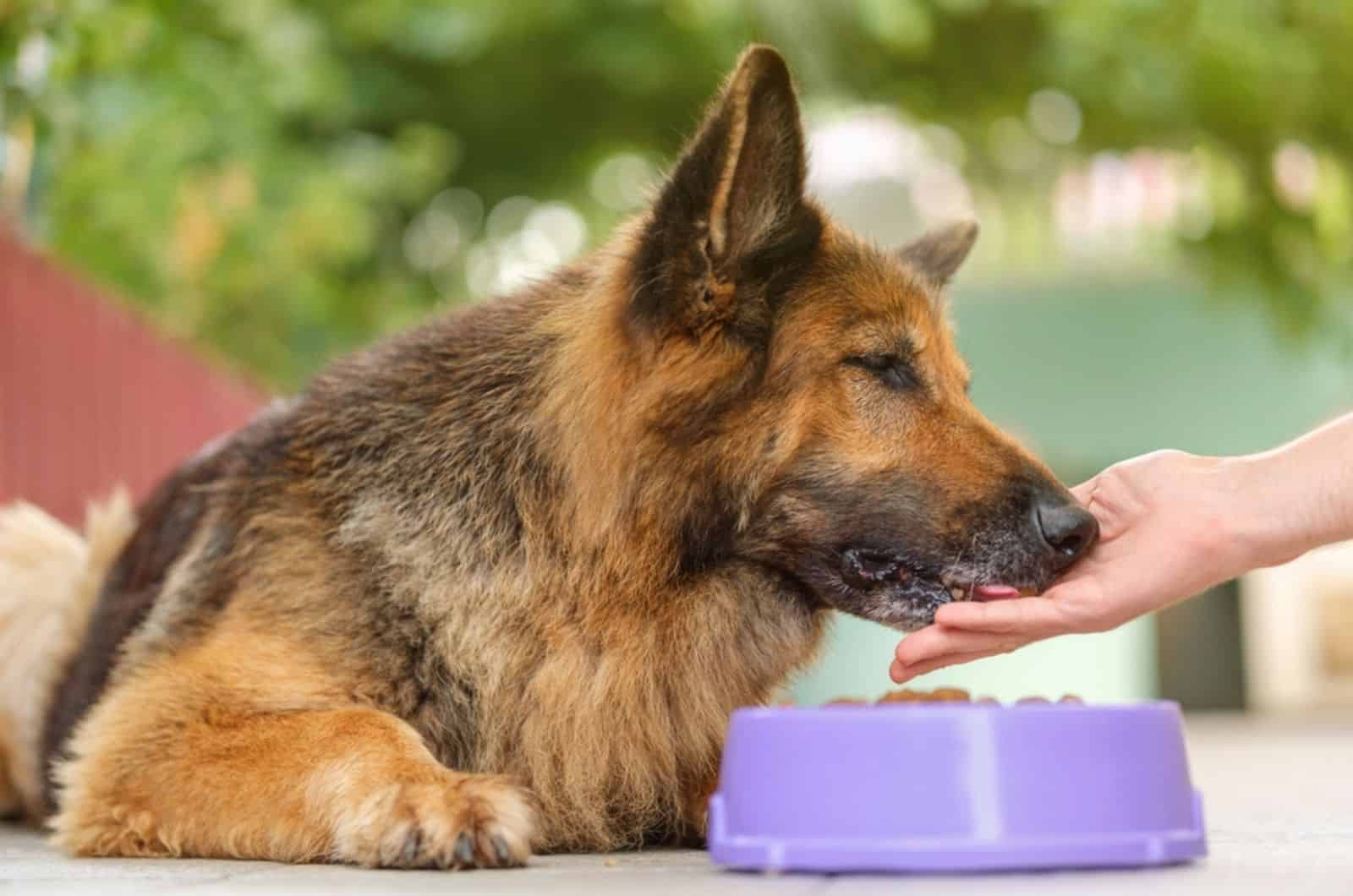
If you have had your GSD since it was a puppy, or if you have adopted your GSD from a shelter and tried your best to calm its nerves and make it trust you, you have probably been doing hand-feeding.
Dog owners frequently unintentionally train their German Shepherds, no matter the type of German Shepherd they have, to consume food from their hands.
Starting with hand-feeding, a timid dog that has been recently added to the household or even feeding a dog leftover food straight from your hands can accomplish this.
There truly isn’t a problem if you don’t mind giving your dog each meal by hand. Hand-feeding their pets, however, is just not an option for the majority of pet owners.
Of course, if you have to leave your GSD with a caretaker or at a daycare facility for any length of time, you will inevitably encounter issues. Making sure your dog can comfortably eat from his own bowl without needing assistance is a good idea.
Final Word
It’s not usually a sign of anxiety for your dog to stop eating, but if this behavior is causing you or your dog any problems, discussing the background of the problem with your nearest veterinarian will help determine the root cause.
Make small changes to increase your big guard dog’s confidence in order to learn to eat on his own.
Make your pet’s dinner especially delectable by including their favorite, difficult-to-resist treat, like a sprinkling of mozzarella or minced chicken, together with his regular kibble food, and then serve your dog during the time you’re in a different room.
By doing this, you can assist your puppy to become acclimated to eating unattended so that eventually, he will be able to eat even if you are away from home.
However, if you notice that your German Shepherd feels as if it is too scared to eat when it is alone, provide him with the comfort of your own presence, and you might as well eat when your GSD is eating, just to overcome that fear.
Try to determine the cause of your German Shepherd’s problem with mealtime, and if you have trouble doing so, we are here to help, as well as your local vet, dog behaviorist, or any kind of dog expert.
